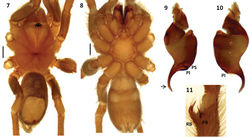Difference between revisions of "Melloleitaoina mutquina"
m (Imported from ZooKeys) |
m (1 revision) |
(No difference)
| |
Latest revision as of 14:13, 25 April 2014
| Notice: | This page is derived from the original publication listed below, whose author(s) should always be credited. Further contributors may edit and improve the content of this page and, consequently, need to be credited as well (see page history). Any assessment of factual correctness requires a careful review of the original article as well as of subsequent contributions.
If you are uncertain whether your planned contribution is correct or not, we suggest that you use the associated discussion page instead of editing the page directly. This page should be cited as follows (rationale):
Citation formats to copy and paste
BibTeX: @article{Perafán2014ZooKeys404, RIS/ Endnote: TY - JOUR Wikipedia/ Citizendium: <ref name="Perafán2014ZooKeys404">{{Citation See also the citation download page at the journal. |
Ordo: Araneae
Familia: Theraphosidae
Genus: Melloleitaoina
Name
Melloleitaoina mutquina Perafán & Pérez-Miles, 2014 sp. n. – Wikispecies link – ZooBank link – Pensoft Profile
Material examined
Known only from types.
Type material
Holotype male from Argentina, Catamarca, Mutquín, 1500m above sea level, 28°19'0"S, 66°10'0"W, 2-ii-1981, E. Maury leg. (MACN-Ar 7737).
Diagnosis
Male differs from other Melloleitaoina species by the palpal bulb morphology with the embolus less curved, absence of triangular tooth, PS very flat and apex widened (Figs 9 and 10). Females unknown.
Description
Holotype male (MACN-Ar 7737): total length, not including chelicerae or spinnerets, 9.4, carapace length 4.1, width 3.7. Color (in alcohol): cephalotorax, legs light reddish brown, cephalotorax with few brown and golden setae, abdomen brown with a patch of urticating setae golden brown. Anterior eye row procurved, posterior slightly recurved. Eyes and interdistances: AME 0.15, ALE 0.20, PME 0.11, PLE 0.15, AME-AME 0.11, AME-ALE 0.066, PME-PME 0.33, PME-PLE 0.022, ALE-PLE 0.077, AME-PME 0.055, ALE-ALE 0.40. OQ length 0.68, width 0.61, clypeus 0.022. Fovea transverse, procurved, width 0.66. Chelicerae with 10/9 well-developed teeth on furrow promargin, 5/3 small teeth on the proximal area of furrow. Labium length 0.48, width 0.78, with 6 cuspules. Maxillae with 38/39 cuspules. Sternum length 1.9, width 1.9. Tarsi I-IV scopula widely divided. Tarsal claws with 1-4 small teeth on proximal half, ventral midline. Sparse scopulae on metatarsi; metatarsus I scopulate on distal third, II apically, III and IV without scopula. Tibia I with prolatero-ventral distal apophysis with two very unequal branches (Fig. 11); PB subtriangular, small, with basal curved spine, much longer than branch, RB curved, around ten times bigger than PB with internal medial spine that exceeds length of branch. Metatarsus I slightly curved, flexion on RB. Femur III thickened. Type III-IV intermediate urticating setae present. Palpal organ piriform with the embolus slightly curved, two prolateral keels (PI and PS) present, PS very flat, apex widened (Figs 9 and 10).
Spination. Femora: palp 0; I 0; II 0; III 0; IV 0. Patellae: palp 0; I 0; II 0; III 0; IV 0. Tibiae: palp 0; I 0; II 1P; III 1V, 1P; IV 1V, 1P, 1R. Metatarsi: I 1V; II 1V; III 3V, 2P; IV 4V, 1P. Tarsi: palp, I-IV 0.
Legs and palpal segments lengths (femur/patella/tibia/metatarsus/tarsus). Palp: 2.2/1.3/1.5/0.8 total 5.8; I: 3.5/2.0/2.9/2.1/1.4 total 11.9; II: 3.0/1.7/2.3/2.1/1.4 total 10.5; III: 2.7/1.4/1.8/2.3/1.4 total 9.6; IV: 3.8/1.7/3.0/4.0/1.8 total 14.3.
Etymology
The specific epithet mutquina is a noun taken in apposition and means place or thing to smell in Quichua language and refers to the locality of Mutquín, where this species is distributed. It denotes the aroma of the flora of the region that emerges especially after rains, perfuming the village of aromatics herbs.
Original Description
- Perafán, C; Pérez-Miles, F; 2014: Three new species of Melloleitaoina Gerschman and Schiapelli, 1960 (Araneae, Mygalomorphae, Theraphosidae) from northern Argentina ZooKeys, 404: 117-129. doi
Images
|
